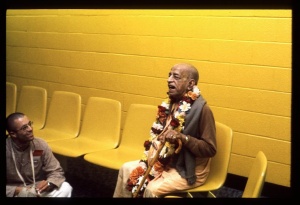CC Madhya 17.121 (1975): Difference between revisions
(Vanibot #0027: CCMirror - Mirror CC's 1996 edition to form a basis for 1975) |
(Vanibot #0020: VersionCompareLinker - added a link to the Version Compare feature) |
||
| Line 2: | Line 2: | ||
<div style="float:left">'''[[Sri Caitanya-caritamrta (1975)|Śrī Caitanya-caritāmṛta (1975)]] - [[CC Madhya (1975)|Madhya-līlā]] - [[CC Madhya 17 (1975)|Chapter 17: The Lord Travels to Vṛndāvana]]'''</div> | <div style="float:left">'''[[Sri Caitanya-caritamrta (1975)|Śrī Caitanya-caritāmṛta (1975)]] - [[CC Madhya (1975)|Madhya-līlā]] - [[CC Madhya 17 (1975)|Chapter 17: The Lord Travels to Vṛndāvana]]'''</div> | ||
<div style="float:right">[[File:Go-previous.png|link=CC Madhya 17.120 (1975)|Madhya-līlā 17.120]] '''[[CC Madhya 17.120 (1975)|Madhya-līlā 17.120]] - [[CC Madhya 17.122 (1975)|Madhya-līlā 17.122]]''' [[File:Go-next.png|link=CC Madhya 17.122 (1975)|Madhya-līlā 17.122]]</div> | <div style="float:right">[[File:Go-previous.png|link=CC Madhya 17.120 (1975)|Madhya-līlā 17.120]] '''[[CC Madhya 17.120 (1975)|Madhya-līlā 17.120]] - [[CC Madhya 17.122 (1975)|Madhya-līlā 17.122]]''' [[File:Go-next.png|link=CC Madhya 17.122 (1975)|Madhya-līlā 17.122]]</div> | ||
{{CompareVersions|CC|Madhya 17.121|CC 1975|CC 1996}} | |||
{{RandomImage}} | {{RandomImage}} | ||
==== TEXT 121 ==== | ==== TEXT 121 ==== | ||
<div class="verse"> | <div class="verse"> | ||
: | :'vedānta' śravaṇa kara, nā yāiha tāṅra pāśa | ||
:ucchṛṅkhala-loka-saṅge dui-loka- | :ucchṛṅkhala-loka-saṅge dui-loka-nāśa" | ||
</div> | </div> | ||
| Line 25: | Line 24: | ||
<div class="translation"> | <div class="translation"> | ||
"Do not go to see Śrī Caitanya Mahāprabhu. Just continue hearing Vedānta. If you associate with upstarts, you will be lost in this world and in the next." | |||
</div> | </div> | ||
| Line 32: | Line 31: | ||
<div class="purport"> | <div class="purport"> | ||
The word ucchṛṅkhala, meaning | The word ucchṛṅkhala, meaning "whimsical," is significant in this verse. In Bhagavad-gītā ([[BG 16.23 (1972)|BG 16.23]]), Lord Kṛṣṇa Himself says: | ||
:yaḥ śāstra-vidhim utsṛjya | |||
:vartate kāma-kārataḥ | |||
:na sa siddhim avāpnoti | |||
:na sukhaṁ na parāṁ gatim | |||
If one acts whimsically and does not follow the śāstric principles, he will never attain perfection, happiness or the spiritual world. | |||
</div> | </div> | ||
Latest revision as of 10:24, 27 January 2020

His Divine Grace
A.C. Bhaktivedanta Swami Prabhupada
A.C. Bhaktivedanta Swami Prabhupada
TEXT 121
- 'vedānta' śravaṇa kara, nā yāiha tāṅra pāśa
- ucchṛṅkhala-loka-saṅge dui-loka-nāśa"
SYNONYMS
vedānta—the philosophy of Vedānta; śravaṇa kara—go on hearing; nā—do not; yāiha—go; tāṅra pāśa—near Him; ucchṛṅkhala—upstart; loka—people; saṅge—in the association of; dui-loka-nāśa—destruction in this world and the next.
TRANSLATION
"Do not go to see Śrī Caitanya Mahāprabhu. Just continue hearing Vedānta. If you associate with upstarts, you will be lost in this world and in the next."
PURPORT
The word ucchṛṅkhala, meaning "whimsical," is significant in this verse. In Bhagavad-gītā (BG 16.23), Lord Kṛṣṇa Himself says:
- yaḥ śāstra-vidhim utsṛjya
- vartate kāma-kārataḥ
- na sa siddhim avāpnoti
- na sukhaṁ na parāṁ gatim
If one acts whimsically and does not follow the śāstric principles, he will never attain perfection, happiness or the spiritual world.